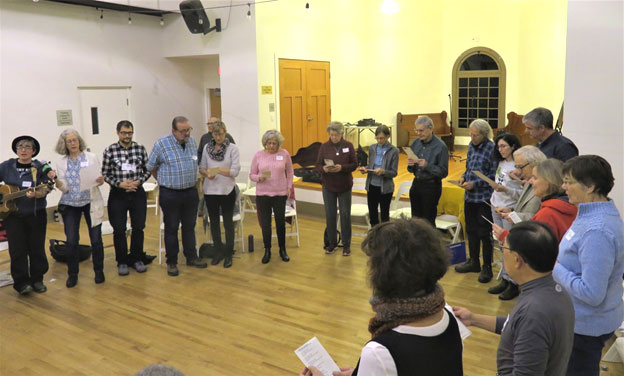Written by Bill Stovin
Local activists believe it’s essential to stay strong, resilient and connected in the face of the global environmental crisis. They delivered that message at GTEC’s first-ever Town Hall, an evening of inspired presentations, discussion and song.
One of the invited speakers, Ruth Walmsley of Burnaby, has organized rallies for the past seven years against Kinder Morgan’s proposed pipeline expansion. She describes the polarized tone of the struggle, the ‘us versus them’ as exhausting.
So Walmsley, a Quaker, decided to protest another way by organizing silent meetings (18 of them to date) on Burnaby Mountain near the Kinder Morgan facilities. These ‘earth worship meetings’ as she calls them, are open to the public and people are encouraged to sing.
“A real sense of community has emerged. All dedicated to resisting the destruction of what we love.”
To help Walmsley stay engaged, she follows three principles. She keeps her focus on community, takes the long view about the struggle and change, and reminds herself that she is not responsible for the outcome. Otherwise, she says it is a sure recipe for burnout.
Maayan Kreitzman, UBC student and a member of the Vancouver chapter of Extinction Rebellion, agrees there is a need to counter burnout. She believes a culture of resilience is what is needed to survive.
Kreitzman says a regenerative culture group has been created within Extinction Rebellion.
“We are making space for people to share their emotions, to talk about grief and sorrow. We’re both acting and grieving with as much conviction as possible.”
Fred Bass knows a lot about resilience. In fact, he facilitates workshops about building personal and community resilience. Bass says resilience is the capacity to bounce back from threatening experiences. In that regard, he says people can demonstrate surprising resilience in crises.
“We face an unprecedented global crisis,’ adds Bass, a former Vancouver City Councillor and well-known health and environmental activist.
“We often expect government to respond to urgent issues but usually it’s just a few people who do. We need to enhance our resilience, speak our truths, connect with nature and ourselves, and join others to take action at the community level.”
Reverend Emilie Teresa Smith, an Anglican parish priest in New Westminster, has also been on the front lines of the environmental movement. She has participated in an International Synod at the Vatican aimed at finding ways for the church to participate in the world campaign to combat climate change.
Reverend Smith is strongly critical of Canadian mining companies for what she calls their environmental damage in countries around the world.
“I’ve had to apologize for many Canadian companies. It’s our responsibility to return the sacred into our lives and to stand up to this oppression and violence.”

left to right: Rev. Emilie Teresa Smith, Ruth Walmsley, Maayan Kreitzman, Fred Bass
After the presentations, participants shared ideas on ways communities can respond to the climate challenge. The discussions were lively with many ideas, big and small, for building awareness of climate change, supporting community and personal initiatives, and mobilizing opposition to those organizations and institutions failing our environment.
GTEC’s Board Chair, Arden Henley, offered this final thought.
“We often hope or expect government will take the necessary steps but unless we complement or provoke governments as communities, the change we need will not take place”
Click here to see the video of this entire event – https://www.gteccanada.ca/town-hall-event/



